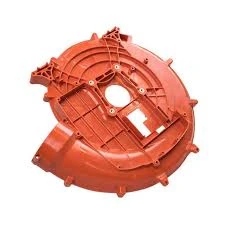Mobile:+86-311-808-126-83
Email:info@ydcastings.com
impeller vortex
Understanding the Impeller Vortex Applications and Mechanisms
In the realm of fluid dynamics, the interaction between moving fluids and solid structures often introduces fascinating phenomena. One such phenomenon is the impeller vortex, a critical concept in engineering and fluid mechanics that has significant implications in various industries. This article delves into the mechanics of impeller vortices, their formation, and their applications in different spheres, including pumps, turbines, and mixing systems.
What is an Impeller Vortex?
An impeller vortex is the spinning motion of fluid that occurs due to the action of an impeller, a rotating component that moves fluid through a system. Impellers are widely used in devices such as pumps and turbines, where they convert mechanical energy into fluid flow. When the impeller blades rotate, they impart energy to the fluid, resulting in a velocity field that can create areas of low pressure, often leading to vortex formation.
The vortex itself can be characterized by its flow patterns, which typically involve a swirling motion around a central core. This swirling can generate complex flow dynamics, impacting the performance and efficiency of the systems in which they are employed.
Mechanisms Behind Vortex Formation
The formation of an impeller vortex can be understood through fundamental principles of fluid mechanics. As the impeller rotates, it generates a difference in velocity between the fluid close to the impeller and that farther away. This differential velocity creates shear forces that contribute to the development of the vortex.
The fundamental equations, such as the Navier-Stokes equations, govern the behavior of the fluid as it interacts with the impeller. These equations describe how fluid velocity, pressure, and density change over time and space, yielding insights into the vortex's characteristics.
impeller vortex

In practical terms, several factors influence vortex formation the design of the impeller, the speed at which it rotates, the viscosity of the fluid, and the geometry of the containment vessel. Understanding these factors enables engineers to optimize system performance, enhance mixing, or improve fluid transport efficiency depending on the application.
Applications of Impeller Vortex
1. Pumping Systems In pumps, impeller vortices play a crucial role in fluid transport. For instance, centrifugal pumps utilize impeller-induced vortices to move liquids efficiently. The design of the impeller affects not only the flow rate but also the energy consumption of the system. Engineers strive to ensure that vortices are harnessed effectively to minimize energy losses and maximize flow efficiency.
2. Mixing Technology Impeller vortices are essential in mixing applications, where uniform dispersion of materials is critical. In chemical processes, for example, powerful impellers create vortices that lead to optimal mixing of reactants, enhancing chemical reactions and product quality. The ability to control vortex characteristics allows for precise manipulation of mixing intensities in various industrial applications.
3. Hydraulic Turbines In turbines, impeller vortices are intricately connected to energy generation. The transformation of fluid energy into mechanical energy relies on the efficient interaction between the fluid flow and turbine blades, which can generate vortices that either enhance or impede performance. Understanding these patterns is essential in turbine design, particularly in optimizing energy capture from flowing water.
4. Aerospace and Maritime Applications In aviation and marine engineering, impeller vortices are studied to understand their effects on drag and lift. For aircraft propellers and ship propellers, the vortices created can significantly influence performance and efficiency. Engineers design propellers with specific vortex characteristics to enhance propulsion and fuel efficiency, showcasing the importance of this concept in transportation.
Conclusion
The study of impeller vortices is a vital aspect of fluid dynamics that has far-reaching implications across multiple industries. By understanding how these vortices form and behave, engineers can optimize the design and functionality of pumps, mixers, turbines, and various propulsion systems. As technology continues to advance, a deeper understanding of impeller vortices will undoubtedly lead to more efficient systems and innovative applications, underscoring the significance of this concept in modern engineering. Through ongoing research and technological advancements, the potential applications for impeller vortices will likely expand, driving efficiency and performance in numerous fields.











